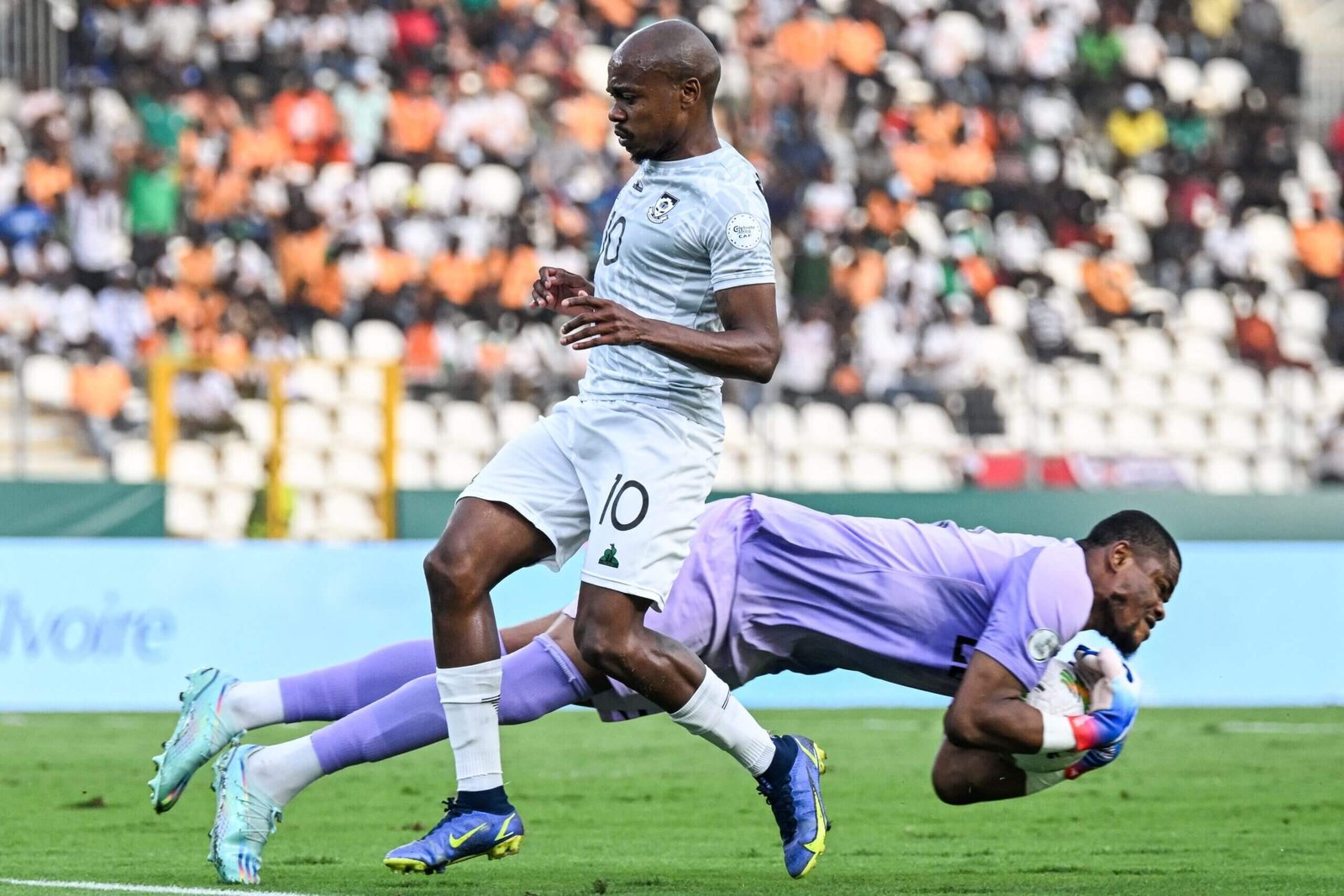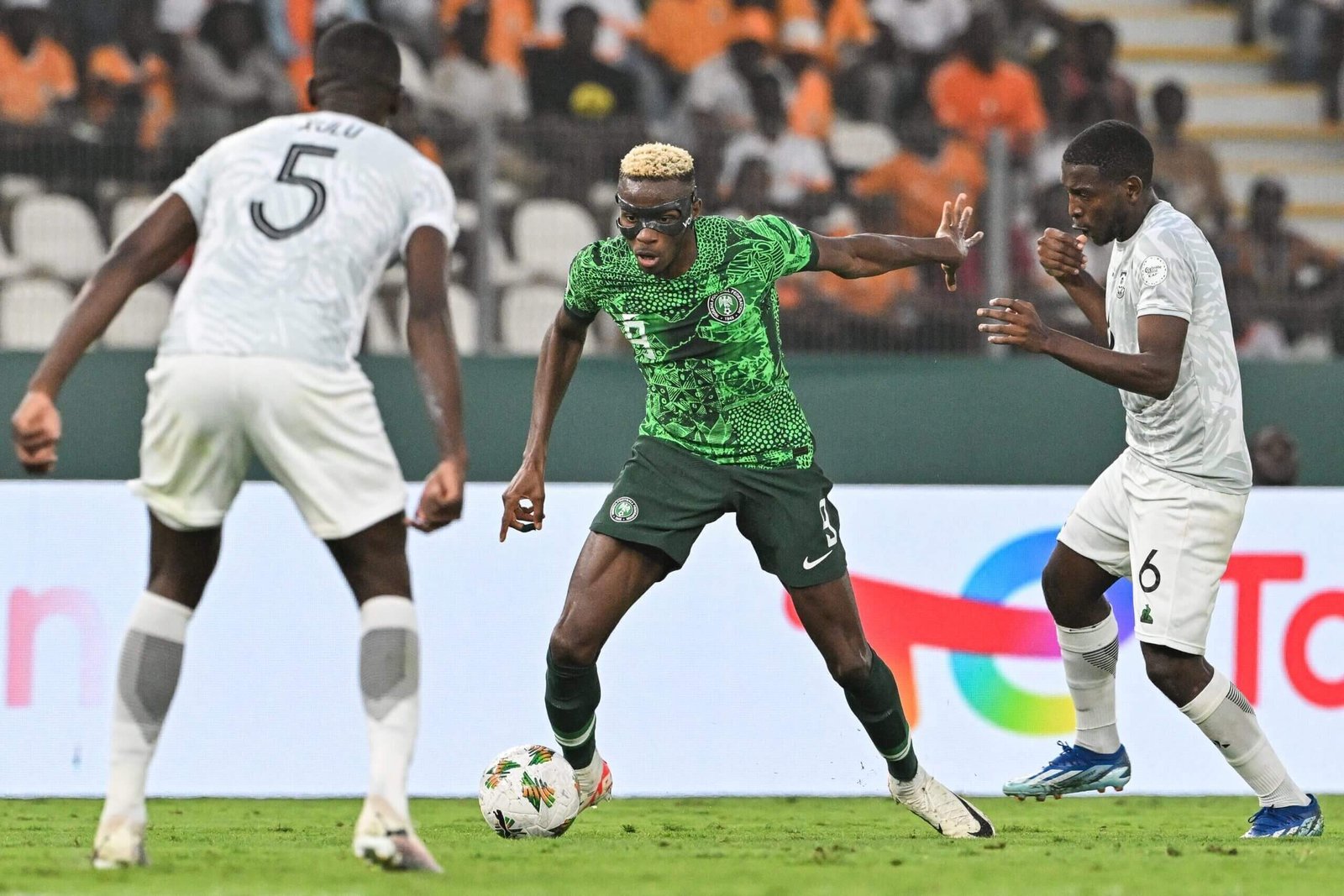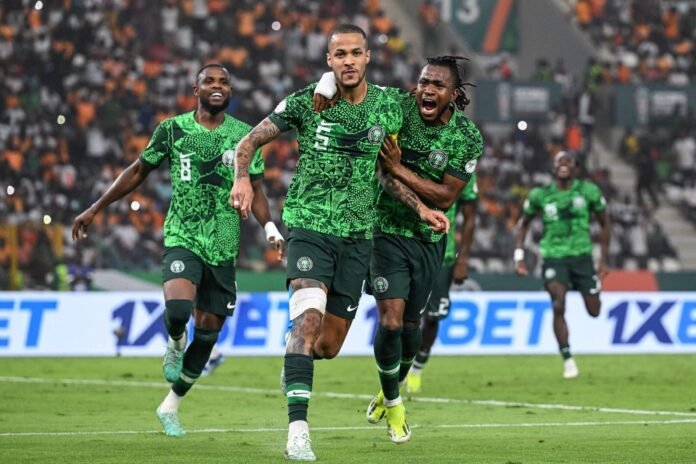Nigeria are through to the AFCON final after beating South Africa in a penalty shootout on a night of ceaseless entertainment.
William Troost-Ekong, Nigeria’s captain, put his side ahead with a 67th-minute penalty which had been won following a stunning dribble by Victor Osimhen.
The Napoli star then looked to have sealed victory for Nigeria with a close-range finish in the 83rd minute, but the goal was overturned by VAR and, sensationally, South Africa were awarded a penalty following a foul in the build-up.
Teboho Mokoena converted from the spot to make it 1-1 and the game went to extra time where both teams had chances to win it, before goalkeeper Stanley Nwabili proved the hero in the shootout to secure victory for Nigeria.
Here, our writers analyse and evaluate the key talking points from the game.
Four astonishing minutes that turned the game on its head
This brilliant tournament has been a phenomenal example of why you need to play right up until the final whistle. Ghana got to the 90th minute of a group game 2-0 up against Cape Verde and found a way to draw.
Mali thought they had beaten 10-man Ivory Coast in the quarter-finals within 90 minutes before a late equaliser sent the match to extra time. Mali then thought they were heading to a penalty shootout before another goal from the host nation knocked them out.
At AFCON 2023, it’s not over until it is over and the final 10 minutes between Nigeria and South Africa was just the latest proof of this.
The Super Eagles thought things were done and dusted when Osimhen tapped in Bright Osayi-Samuel’s cross to make it 2-0 in the 84th minute. A brilliant team counter-attack had led to jubilant celebrations. Nigeria were heading to the final.
But then, a huge twist. VAR had spotted Nigeria midfielder Alhassan Yusuf had fouled Percy Tau in the other penalty area at the start of the move.
Incredible.
Nigeria thought they had scored a second. But minutes later, the goal is disallowed, South Africa are awarded a penalty and the scores are level.#AFCON2023
🎥 @SkyFootball pic.twitter.com/KG9lRJJkOH
— The Athletic | Football (@TheAthleticFC) February 7, 2024
The referee was called over to the monitor to watch the incident, and you could almost sense more than 200million Nigerians holding their breath.
After a dramatic wait, Osimhen’s goal was chalked off. A penalty was awarded and Teboho Mokoena duly converted for South Africa.
A potential 2-0 win was turned into a 1-1 draw in the space of four astonishing minutes.
South Africa celebrate their dramatic equaliser (ISSOUF SANOGO/AFP via Getty Images)
It was the sort of late drama that has been this year’s tournament’s trademark. Nigeria thought it was all over, only to realise they had another 30 minutes to play. Nigeria captain Troost-Ekong could be seen pointing to his temples asking his teammates to calm down and focus after conceding the equaliser but… how could you? One of the most remarkable endings to the first 90 minutes of a semi-final had just taken place. Everyone was in need of a bit of a breather.
Carl Anka
South Africa spurn glorious chances
South Africa have not been prolific scorers in this tournament, with their progress reliant on a defence which entered Wednesday’s semi-final having kept four consecutive clean sheets. Yet with Nigeria’s attacking threat — no side has produced a higher xG this competition — South Africa knew they would likely need goals to progress.
Nigeria’s shape was notionally a 3-4-3, but often featured four in defence depending on what stage of build-up play South Africa were in. This fluidity, while helping Nigeria’s transitional ability, could be exploited by South Africa’s centre-backs, who timed accurate long balls into the spaces behind the opposition wing-backs.
Tau had one big early chance — lashing a ball straight at Nigerian goalkeeper Nwabali on the half-turn. Nwabali, who plays in the South African league for Chippa United, had an excellent first half, making one excellent save from Evidence Makgopa, whose shot appeared destined for the top corner.
No team has had more direct attacks than South Africa in this year’s AFCON — and with Tau finding space behind Nigeria’s high line on several occasions, opportunities continued to fall his way. One notably clear sight of goal, when he was one v one against Nwabali, was spoilt by a heavy touch.

Nigeria goalkeeper Nwabali denies Tau (ISSOUF SANOGO/AFP via Getty Images)
With Nigeria failing to find much early fluency, South Africa wasted the chance to seize an early lead — and then fall back on their excellent defence.
Though Mokoena’s late penalty rescued South Africa’s hopes, there was still a glorious late chance for them to win it in normal time. Makgopa and Khuliso Mudau grew in prominence — and the latter missed an open goal with seconds left after Mokoena’s free-kick was parried into his path.
Jacob Whitehead
Osimhen overcomes sickness to finally ignite tournament
Ademola Lookman has been Nigeria’s best player this tournament — but it is still Osimhen who is their most important player.
The Napoli striker, who is Africa’s reigning men’s footballer of the year, is the outstanding individual player left in the tournament.
Semi-finals are tense affairs which churn and flip the stomach. Osimhen’s past few days have embodied that. He was a doubt on Monday, not travelling with the rest of the squad due to “stomach discomfort” — and was only cleared to travel on Tuesday. Nigeria finally confirmed his availability to play later that evening.
After just 30 seconds, the striker stretched to reach a through ball — only denied from a clear sight of goal by an excellent tackle from Siyanda Zulu. Osimhen, virtually untouched, went down holding his abdomen. Nigeria watched on, unease rising in their throats, before Osimhen rose and began to jog.
This has been a strange tournament for Osimhen, who, despite his undoubted class, has looked out of sorts at times. Entering the semi-final, Osimhen had only scored one goal despite having more shots (19) than any other player, and producing an xG of 3.09.
Though a subtle touch from South African keeper Ronwen Williams pushed Ola Aina’s cross inches clear of Osimhen’s head, Nigeria’s star man did have chances — sending one unmarked header wide from a corner, and looping another more difficult chance over the bar.
However, he had struggled with link-up play — having the fewest touches of any player on the pitch at half-time. Osimhen’s solution? Do all the build-up himself.

Osimhen on the ball (ISSOUF SANOGO/AFP via Getty Images)
After 65 minutes, Osimhen picked the ball up with little on, and was surrounded by South African defenders. He evaded three of them without truly beating them — before spotting a corridor of space. It was Nigeria’s route to the final. He burst through with a five-yard acceleration, provoking a clumsy challenge from Mothobi Mvala. Clear penalty.
William Troost-Ekong squeezed the ball under Williams to open the scoring. Osimhen did not score — but battling his stomach, still produced his signature moment of the tournament. With 10 minutes left, he looked to have scored after a simple cross — but Nigeria’s celebrations were dramatically cut short.
The Napoli star was later taken off in the second period of extra time.
Jacob Whitehead
Moffi’s late impact
It was a big call from Jose Peseiro to take off Osimhen in the second half of extra time, but the Napoli striker isn’t match fit. Substitute Terem Moffi came on probably thinking he’d have to take a penalty in the shootout, but his first touches of the ball saw him knock the ball into space into the penalty area before Grant Kekana’s tackle got him on his left leg, causing the forward to take a tumble and miss a possible chance.
VAR reviewed the tackle… and then judged the foul to have happened just outside. Kekana was sent off. Nigeria were awarded a free kick just outside the box.
So, this dramatic game went to a penalty shootout between two of the tournament’s best goalkeepers.
South Africa’s Ronwen Williams had saved four penalties against Cape Verde in the quarter-finals and Nwabali had been one part of the most stubborn defences at this year’s tournament. Both men were consulting water bottles with instructions.
Moffi went first and repaid his manager’s faith to give Nigeria a lead they never relinquished and send them to the final.
Nobody wants to be the favourites at this AFCON, but Nigeria fans have good reason to be be confident ahead of Sunday’s final.
Carl Anka
Nigeria end semi-final hoodoo
Nigeria is an African superpower. They are the continent’s most populous country, with over 213 million inhabitants. Their football team is always amongst the favourites in any AFCON they enter. In Osimhen, they have one of Africa’s outstanding players.
Yet they have only won three AFCON titles — just the fourth-most — and have only won once since 1994 (in 2013).
Why? Here’s a clue. Wednesday was Nigeria’s 15th AFCON semi-final — more than any other team — yet their record at this stage is dire. They have only won one of their past six semi-final matches, including a heartbreaking defeat to Algeria in 2019, where Riyad Mahrez’s stoppage time free-kick sentenced Nigeria to a 2-1 defeat.
Several of the Nigerian squad are veterans of that day — and amidst the pressure of such a football-obsessed nation, these things linger.
Against South Africa, Nigeria faced a psychological challenge — they appeared set fair at 2-0 up after Osimhen seemed to double their lead, before VAR’s intervention suddenly sent them back to 1-1. In extra-time, the challenge was to regroup mentally as well as stylistically.
After Osimhen missed another chance in extra-time, Nigeria had reason to continue doubting. But Williams could not repeat his goalkeeping heroics in the semi-final shootout — and Kelechi Iheanacho ended a long history of semi-final heartbreak.
Jacob Whitehead
What did the managers say?
We will bring you both manager’s post-match comments as soon as we have them.
What next for both teams?
Nigeria will play the winner of Ivory Coast v DR Congo in the final in Abidjan on Sunday at 8pm GMT (3pm ET). That second semi-final takes place today (kick-off at 8pm GMT).
South Africa will face the loser of that match in the third-place play-off on Saturday at 8pm GMT.
Recommended reading
(Top photo: ISSOUF SANOGO/AFP via Getty Images)
Read the full article here


